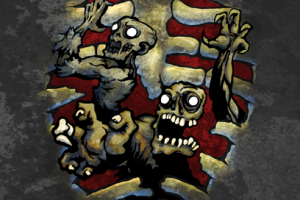Yesterday, the 2011 XYZZY Award winners were announced. Zombie Exodus by Jim Dattilo was nominated in ten categories, including Best Game; it won only one award, a “Special Recognition” award, which was devised after voting started.
This happened because folks from the ChoiceScript community and/or fans of Zombie Exodus voted as a block. In the first round of voting, where voters nominated games out of a list of more than a hundred, a large number of people voted as a block for ChoiceScript games. In round two, the votes were split approximately 50/50: votes for Zombie Exodus, and votes for everyone else.
Without intervention, Zombie Exodus would have swept the awards, winning in every category for which it was nominated.
The XYZZY Awards are normally decided by a close knit community of interactive fiction enthusiasts; more than a hundred votes is a good turnout for XYZZY.
But this year, our votes completely overwhelmed the entire interactive fiction community. I think it’s fair to say that most of the voters for ChoiceScript games did not play any of the non-ChoiceScript games in the competition; they didn’t give the other games a fair shot. In discussions on intfiction.org, some folks were calling the voting block a “community invasion,” and I can’t entirely disagree.
(To be clear, XYZZY does not have a rule against blogging about the competition or campaigning for votes, but it’s normally “not done.” Ben Cressey on intfiction.org said, “I don’t have a problem with your [blog post on choiceofgames.com], but I do think it’s a shame that it was so effective.” In my opinion, that captures the tone of the discussion.)
In response to obviously lopsided voting patterns, and in conversation with Jim and Choice of Games, the organizers of the XYZZY competition chose to intervene, separating votes that went exclusively toward ChoiceScript games from all other votes.
We fully support their decision, although I think nobody’s really happy with the way things turned out.
On the one hand, we’re proud of Jim and the votes that Zombie Exodus earned; we rocked the vote.
On the other, we have nothing but the utmost respect for the winner of this year’s XYZZY Awards, Cryptozookeeper by Robb Sherwin. (It won Best Game, Best Writing, Best Setting, Best NPCs, and Best Individual NPC.) It was in the making for five years, and it shows: it comes on a DVD with a full album of background music and interstitial images. And it’s well written to boot! We’d like to offer a hearty congratulations to Robb for his accomplishments.
We’re in discussions with the XYZZY Award organizers to decide what to do for next year’s competition, to guarantee that the awards are fair to everyone involved.
For now, we should take this opportunity to celebrate the winners of the XYZZY Awards. There were some awesome games last year; now’s a great time to check them out!







 Steam
Steam Twitter
Twitter Facebook
Facebook Tumblr
Tumblr RSS Feed
RSS Feed

